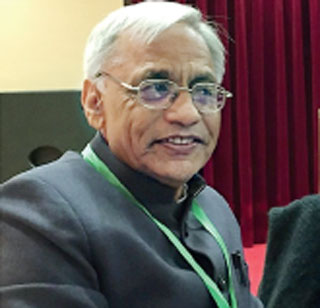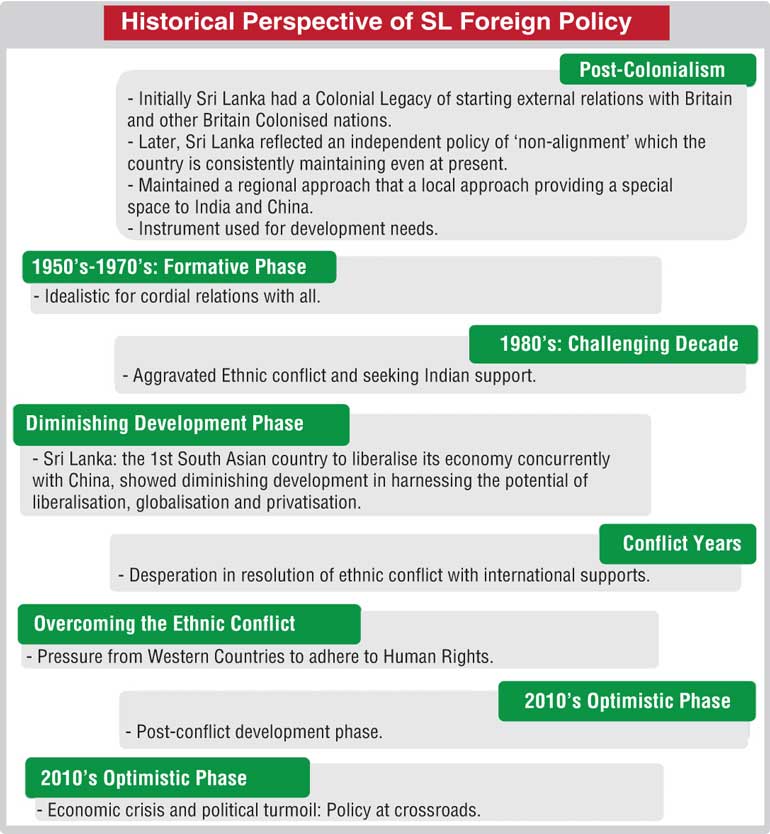Wednesday Feb 18, 2026
Wednesday Feb 18, 2026
Saturday, 3 December 2022 00:05 - - {{hitsCtrl.values.hits}}

University of Rajasthan, India South Asia Studies Centre former Director and Emeritus Fellow Professor Karori Singh

Chongqing Jiaotong University, China Lecturer in International Economics Dr. Shuwen Yan

University of Colombo Department of Economics Professor in Economics Sirimal Abeyratne
 This article is based on the virtual discussion at the monthly seminar series organised by the Sri Lanka Economic Association (SLEA) held on 1 October, under the theme ‘Policy choices before a small state: Sri Lanka, balancing relations with India and China’. The main resource person was Professor Karori Singh, the former Director and Emeritus Fellow at the South Asia Studies Centre of University of Rajasthan, India and the discussant was Dr. Shuwen Yan, a Lecturer in International Economics, Chongqing Jiaotong University, China. The session was moderated by Senior Professor Sirimal Abeyratne from the Department of Economics, University of Colombo. The views expressed in the article are those of presenters and do not reflect views of SLEA.
This article is based on the virtual discussion at the monthly seminar series organised by the Sri Lanka Economic Association (SLEA) held on 1 October, under the theme ‘Policy choices before a small state: Sri Lanka, balancing relations with India and China’. The main resource person was Professor Karori Singh, the former Director and Emeritus Fellow at the South Asia Studies Centre of University of Rajasthan, India and the discussant was Dr. Shuwen Yan, a Lecturer in International Economics, Chongqing Jiaotong University, China. The session was moderated by Senior Professor Sirimal Abeyratne from the Department of Economics, University of Colombo. The views expressed in the article are those of presenters and do not reflect views of SLEA.
Being a small state in an unequal world order: Policy choices
Despite the United Nations Charter ensuring equal treatments for every state, countries differ to a greater extent and this inequality generates multitudes of issues in international relations. Accordingly, small states are more vulnerable in this system compared to the powerful states. However, it is not the end of hope for the small states. They can collaborate with regional and transregional organisations which can assist in reducing their vulnerabilities. Sometimes being a small state would also provide opportunities to leverage through these vulnerabilities. Singapore has successfully overcome these vulnerabilities and has reached a level of economic development even better than some large countries.
Prof. Karori identifies several policy options for small states in the international system; ally with a large state, form a group of smaller states, become a member of an extra-regional alliance or strengthen regional grouping and/or attempt to remain neutral of buffer state. However, one should keep in mind that these policy choices are not without their own positives and negatives. Thus, the choice of a policy should be decided with careful consideration.
Overview of foreign policy making of Sri Lanka
The foreign policy making in Sri Lanka has its own colonial legacies. Later during post-colonialism, Sri Lanka started its independent foreign policy making where her actions were significant towards the Non-Alignment Movement along other countries. It can be seen to have continued to the present day to some degree. Thereafter, the policy stance as Prof. Karori argues is more oriented towards a regional approach rather than the global approach. Prof. Karori emphasises that there has been a special place for India and China in Sri Lankan foreign policy making. Later, Sri Lanka used the foreign policy as an instrument to fulfil the development needs of the country. In this regard, the country needed close relations with other countries such as Japan.
Need of India and China amidst the economic crisis and turmoil: Sri Lanka at policy crossroads
Despite the two countries having differing perspectives and approaches, Sri Lanka has continuously reflected a sensitised attitude trying to maintain cordial relations with the two countries. However, there also exists irritants and issues of misunderstanding about China’s relations with Sri Lanka.
The existing economic crisis and political turmoil has questioned the ability of the country to maintain balanced relations with external countries while effectively addressing the economic complications. The Sri Lankan collapse is unacceptable since most of the external factors cited as reasons are common for many vulnerable-developing countries except the inadequate responses from the Government, as Prof. Karori highlighted.
However, Sri Lanka’s different perspective on the West necessitates the country to expect more help from India and China more than that of western countries, and both countries have made their contributions to deal with the complications arising from the existing crisis. However, it cannot be ignored that these are not completely free from costs or interests. While Sri Lanka seeks development support, it is obvious that India and China are not expecting Sri Lanka to contribute to their own development. According to Prof. Karori, Sri Lanka has a greater role in their respective foreign policies in the Indo-Pacific region, and maintaining a hibernating foreign policy is of utmost importance.
Like other larger countries, there is emphasis on bilateralism rather than regionalism. He emphasised the importance of understanding the nature of these relationships. The relations with China are more commercial and pragmatic while with India it is more accommodative and sensitive. Sri Lanka has a challenge to defend its economic and commercial relations with China while assuring India to address its security concerns.
In response to these complex realities, the Sri Lankan context cannot be fully understood by the existing theories which requires devising a new theory for scientific understanding and policy prescription.
Way forward for Sri Lanka
Last, Prof. Karori referred to a couple of important policy options and decisions at hand; the priority being the need of a doner conference to address the immediate issues in Sri Lanka. Sri Lanka also needs to be sensitive and cautious about several concurrent concerns related to the foreign policy stance of India and China. However, the country is yet to enhance domestic stability and strength as they are preconditions of an effective and independent foreign policy.
Prof. Karori concluded that Sri Lanka should understand that India and China have vital security, strategic and economic interests in the Indo-Pacific region and Sri Lanka matters as a small state that has greater impact in the region.
Role of large states in the international system: A collaborative future for Asia
According to Dr. Shuwen the focus on the international system has mainly been on the large economies while small states have been neglected to a certain extent which has ultimately restricted the small countries’ possibilities for economic progress. According to her, it is unfair to highlight the rivalry between China and India when China-India trade relations have increased significantly. On the other hand, considerable attention in economics in the past few years had been given to the obstacle of trading among larger states in the world, especially with respect to Asia, which resulted in the attention on small states to be almost neglected. Even though there are some actions taken between individual countries, the lack of major actions at the global level; targeting the small states has undermined possibilities for development.
A comprehensive program for economic and strategic cooperation among Asian countries is important. Especially countries like China and India should cooperate with smaller states with good spirit and agenda to promote equitable distribution among nations and within nations. Accordingly, it should promote areas such as research and international collaborations among countries, entrepreneurial programs and develop transportation and supply chains integrating the concerned small economies to support them internally and externally.


(The writer is the Business Editor of the Sri Lanka Economic Association (SLEA) and is a Lecturer (probationary) attached to the Department of Economics, University of Colombo.)